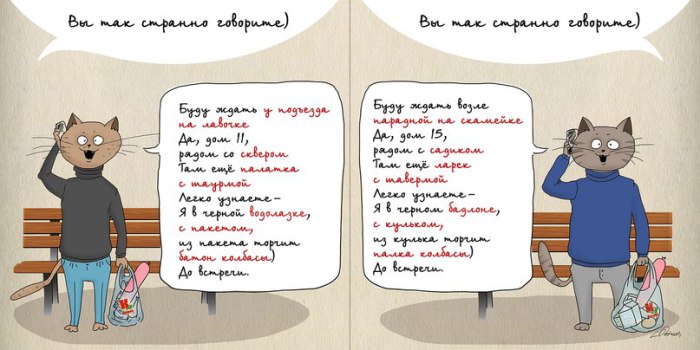Moscow and St. Petersburg это две стороны одной медали, два города, олицетворяющих Россию (are like two sides on a coin, two cities, symbolizing Russia). Moscow is smart, active and dynamic. St. Petersburg is a cultural, tempered city, filled with history and architectural splendor. The residents of those two capitals are completely different, and also the way of life which in a long established environment, leaves an imprint on the character of their citizens.

And the dissimilarity between the two cities doesn’t end here. Манера говорить также отличает московское и петербургское сообщества (the way of speaking also confers a distinction between the community of Moscow and St. Petersburg). That is, though they have in common Russian language, the way it is spoken in the two capitals are very different. Therefore, some linguists have noted the existence of так называемых, московского и петербургского говоров (so-called Moscow and St. Petersburg dialects).
The differences consist of a number of factors: a particular accent, the use of words and their synonyms, differences in the intonation. Оба варианта произношения при этом остаются понятными подавляющему большинству жителей огромной территории Российской Федерации (both variants of the pronunciation in that case remain understandable for the vast majority of inhabitants of territory of the Russian Federation), as well as not radically different from the norms of the Russian language.

The reasons for some discrepancy in the use of our language has to do with the difference in the history of the founding of both capitals, as well as a rupture in the historical time of the formation of the cities. For example, Peter the Great has to bring countless specialised workers (architects, builders, engineers) from abroad. And Russian merchants also were among the participants in the building of the city. This community of “first builders of the city” later became the bases for the formation of an intelligent and educated population in St. Petersburg.
All the participants in the construction of St. Petersburg knew that for a successful stay in the country, they needed to know its language. For foreigners, who arrived in Russia, learning the language in a natural way was impossible as they were surrounded by people of different social classes, speaking hundreds of Russian dialects. This is why, foreign visitors of the northern capital at the time turned to the written sources for the study of Russian. This is the main reason why the norm of pronunciation and the usage of words in St. Petersburg, to a greater extend, prevails in books and literary standard of Russian, and not in spoken language.
And this is how the differences were born between the dialect of Moscow and St. Petersburg. Here are few examples:
Moscow
|
St. Peterburg
|
Translation
|
| подъезд |
парадная |
entrance, front door |
| бордюр |
поребрик |
road kerb |
| водолазка |
бодлон |
polo-neck sweater |
| проездной |
карточка |
travel card
|
| эстакада |
виадук |
overpass, flyover |
| шаурма |
шаверма |
doner kebab |
| батон |
булка |
long loaf of bread |
| палатка |
ларёк |
vendor stall |
Юлия Соколова


 ENROLL!
ENROLL!